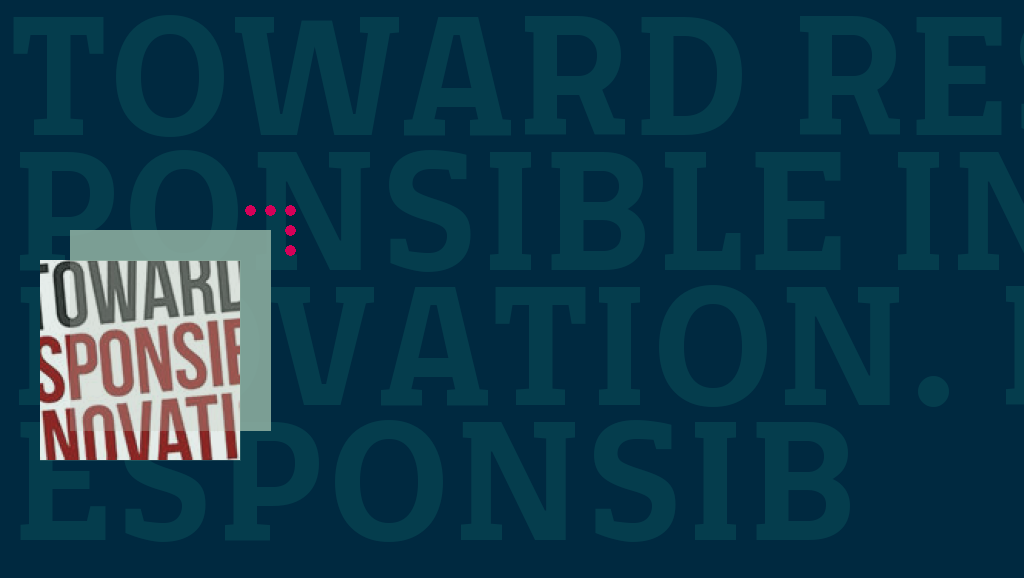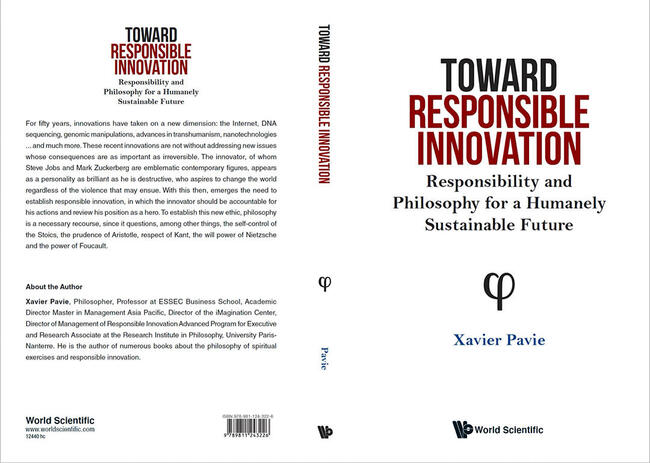In this post I would like to offer some personal thoughts and interpretation on the latest book from Xavier Pavie, Toward Responsible innovation. Responsibility and Philosophy for a Humanely Sustainable Future.
Xavier Pavie
In the biography that precedes the first chapter, Pavie describes his research activities as addressing the notion of responsible innovation through philosophy and spiritual exercises, a description that really drew me in to reading the book. This was not the first time I had read Pavie’s work though, he has been well known in the field of RI for many years, co-authoring one of the first academic books, Responsible Innovation. From Concept to Practice with Victor Scholten and Daphné Carthy back in 2014 (just a year after Owen, Bessant and Heinz published their edited collection Responsible Innovation, Managing the responsible emergence of science and innovation in society). Read the book review in the Journal of Responsible Innovation.
Regular Bassetti Foundation website followers might also know of his involvement in the VIRI, his 2015 article in the Journal of Responsible Innovation (reviewed here) and chapter in the International Handbook on Responsible Innovation (with abstract available here).
Toward Responsible innovation. Responsibility and Philosophy for a Humanely Sustainable Future
The book opens with a quote from philosopher, Ludwig Wittgenstein: ‘Philosophy is not a body of doctrine but an activity’. This is taken from one of Wittgenstein’s 7 propositions in his Tractatus logico-philosophicus.
This is a fundamental concept for the book as it not only describes philosophy itself but also explains how it can be used as a tool to drive innovation towards responsibility.
The following are my own 7 propositions based on my understanding of Pavie’s book.
1. Innovation is an activity that is open to testing. The appropriate analytical tool is philosophy, itself an activity and way of life. Testing innovation through philosophy will help it to develop along more responsible lines.
2. Innovation is constituted by individuals, processes, proposals and objects. It is the way the world advances, practiced within a liberal context it sits hand in hand with politics. There is no innovation without disobedience, creation and destruction or industrial exploitation.
3. Innovation masters the innovator. Technological advances and possibilities mean that action is no longer an issue of moral or scientific acceptability, it is one of duty in the name of ethics and responsibility.
4. Responsibility requires the questioning of proposed responses to individual and societal needs.
5. Applying the current RI approach to the processs of innovation actually pushes responsibility towards becoming unquestioned, as ‘responsibility without fault tends to lead to the weakening of responsibility‘. The following of a norms-based approach neither works nor supports the stated aim of responsibilizing action.
6. The move towards responsibility in innovation must be driven by ‘care’. The focus of investigation must be the individual (the innovator) rather than the structure of the innovation process. The innovator must become an innovator-carer, making decisions based upon who they are rather than their role within the process.
7. Philosophy is the appropriate tool for guiding the innovator, philosophy as a way of life, lived through spiritual exercise, guided by a Master and leading to a form of enlightenment. The innovator and the philosopher are one.
An Overview of the Book
This book really demonstrates the breadth of thinking about and approaches taken to responsible innovation. Pavie’s approach differs from almost all the academic literature in the field as it positions the individual innovator at the centre of focus. The question of education and what we could see as ‘enlightened innovators’ has always been present in responsible innovation, but it has been addressed from a much more process-based and prescriptive perspective. Objectives and techniques have been the mainstay, the construction of a ‘responsible process’, or the sharing of opinion both within groups and externally with the aim of democratizing the innovation process.
Pavie aims at enabling the innovator to question their own responsibility towards humanity through innovation, rather than addressing (and feeling responsible towards) the innovation process in terms of its responsible-ness. He proposes that we take a step beyond formalized thinking about process or technique, and into self-reflection (described as a spiritual approach).
This difference is reflected in the sources used. Of the regular RI stalwarts, we find Hans Jonas on responsibility, Von Schomberg’s definition of RRI (used to demonstrate the difference between RI and RRI), Bruntland’s UN report on Our Common Future, and Schumpeter on economics and capitalism, but what we might call ‘mainstream RI methodology’ does not appear as it is external to the line of the book.
The imposition of the types of norms and approaches that these approaches to RI propose, does not lead towards responsible behaviour according to Pavie, but actually reduces responsibility, a move that directly contradicts the aims of responsible innovation. Pavie seems to aim for a purer, higher-level form of responsibility, based in the individual rather than being external.
Rather than structure, and individual responsibility towards that structure and the norms that pervade it, the approach relies on self-examination, a sort of responsibility to one’s own wellbeing based upon an interpretation of responsibility that is informed through living through philosophy as a way of life.
This living of philosophy is built using transdisciplinarity, knowledge built above discipline, through immersion in art, literature, curiosity and imagination. It is practiced, through spiritual exercise, meditation and speaking aloud, it is lived. This requires dialogue with a figure that Pavie calls a ‘Master’, an individual who is capable of leading the innovator into an understanding of how to work practically towards a prosperous and benevolent society.
Could this approach relate to Bassetti Foundation thinking?
Here at the Bassetti Foundation we have developed an analytical approach to responsible innovation based upon President Bassetti’s concept of Poiesis-intensive Innovation. This form of innovation is not capital but rather experience intensive. It relies on creativity, it is transdisciplinary, requiring not only technical but also philosophical understanding of the values practiced within an individual workspace.
It requires learned knowledge, learned through practice within a workplace through something that we might see as akin to apprenticeship. On closer examination, we could say that apprenticeship involves a relationship that might look rather like Pavie’s relationship with a Master, involving the learning of values alongside skills, the living and practicing of a philosophy at work. Although archaic, the word ‘Master’ is still in use in craft guilds, ‘The Guild of Master Craftsmen’ being an obvious example.
If we could see the use of Master in these terms, an individual with mastery over a skill, able to teach not only its technical side but also the values tied to production choices and a shared moral framework within which working and process decisions are made on a daily basis, then the two ideas show certain similarities. Arguments about ‘the right way to do the job’ from my own work on narrative within craftwork and responsible innovation could also be represented in this way. A responsible narrative in the workplace, built through everyday behaviour and conversation leading to a shared understanding of why decisions are taken within one context or another.
After all, what is craft-work talk if it isn’t a conversation with a Master?
—————–

















